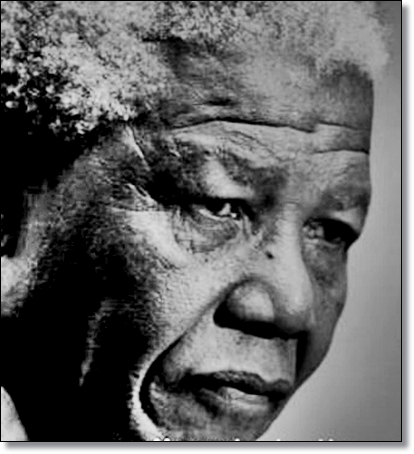Mandela will Forever Live in our Hearts

 |
Mandela has had rare attributes in contemporary times. His steadfastness in fighting against apartheid on the conviction that human beings deserve due dignity and justice, sacrificing his own freedom and foregoing the comfort and company of his family in confinement for almost three decades, teaching forgiveness, not insulting adversaries, and serving for only one term aren't only uncommon attributes of a leadership genius but also great reason why Nelson Madiba Mandela will forever reign as a well distilled leadership icon.
Mandela studied the interests of his captors and used the knowledge to win over their hearts and unite South Africa. For example, the Invictus depicts Mandela not only as a calm person but one who had his country's unity at heart. It illustrates that while attending a game of the Springboks, the country's rugby union team, Mandela recognized that the blacks in the stadium cheered against their "home" squad, as the mostly-white Springboks represented prejudice and apartheid in their minds. He remarked that he did the same while imprisoned on Robben Island.
Earlier, the blacks had persuaded him to disband Springboks or change its colors and emblem but he declined lest this would spark violence and stifle his fight against apartheid. He encouraged them to forgive: “Forgiveness liberates the soul. It removes fear. That is why it is such a powerful weapon.” But what do we hear from our leaders? Demonizing their predecessors and swearing to crush their opponents. How many wouldn't want to avenge the injustices suffered?
Mandela, “The father of the Rainbow Nation” and “Ultimate Public Servant” was born on July 18, 1918 in Mveso, Transkei, South Africa. He became actively involved in the anti-apartheid movement in his 20s, Mandela joined the African National Congress in 1942. For 20 years, he directed a campaign of peaceful, non-violent defiance against the South African government and its racist policies.
He remained true to his words: "I hate race discrimination most intensely and in all its manifestations. I have fought it during my life; I fight it now, and will do so until the end of my days." he remained faithful and relevant to his mission. He consistently fought for peace using non-violent means, earning himself international recognition and winning many prestigious prizes.
Mandela's opposition to injustice began as early as about 1940 when in his second year of study at the University College of Fort Hare, he was elected to the Student Representative Council but because for some time, students had been dissatisfied with the food and lack of power held by the SRC, majority of them voted to boycott unless their demands were met. Mandela resigned his position and seeing this as an act of insubordination; the university's head, Dr. Kerr expelled him for the rest of the year. He was given an ultimatum to return after if he reconsidered his decision. Mandela never backtracked. Mandela's foster father, Regent Jongintaba, was furious and told him to back but Mandela wasn't willing.
Later, the regent announced that he had arranged a marriage for Mandela as a way of ensuring that Mandela's life was properly planned. Mandela shunned this and went to settle in Johannesburg, where he did assorted jobs while completing his bachelor's degree via correspondence courses. He then enrolled at the University of Witwatersrand in Johannesburg to study law.
He would soon become actively involved in the anti-apartheid movement, joining the African National Congress in 1942 and for 20 years, directed peaceful, nonviolent acts of defiance against the South African government and its racist policies, including the 1952 Defiance Campaign and the 1955 Congress of the People. This led to his arrest in 1956. He was charged with treason but was later acquitted.
In 1961, Mandela, changed his strategy from nonviolent protest to armed struggle and subsequently co-founded Umkhonto we Sizwe, also known as MK, an armed offshoot of the ANC dedicated to sabotage and guerilla war tactics to end apartheid. In 1961, Mandela orchestrated a three-day national workers' strike for which he was detained for five years first and would later, upon trial, face life imprisonment in 1963. He was confined to Robben Island for 18 of his 27 years in prison and released in 1990. In 1991, Mandela was elected president of the African National Congress, becoming the first ever South African President, a position which to the dismay of many, he held for only five years!
How many leaders would go through such injustice, become President and relinquish power in such a short time? It takes selflessness, love and vision for one's nation. In Africa, only Mwalimu Julius Nyerere came closer to Mandela. For the rest of us, is this too hard to emulate? Mandela will always live in our hearts.
By Patrick Katagata
[email protected]
